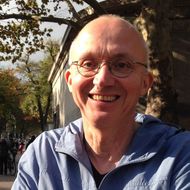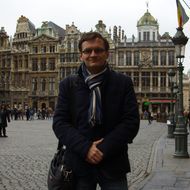- A
- A
- A
- ABC
- ABC
- ABC
- А
- А
- А
- А
- А
- HSE Campus in St. Petersburg
- School of Arts and Humanities
- Department of Philology
- News
- HSE SPb Researchers to Receive Russian Science Foundation Grants
-
Department
-
Sсienсe
-
Education
- Bachelor's programs
- Master's programs
 Musical Stimulacra: Literary Narrative and the Urge to Listen
Musical Stimulacra: Literary Narrative and the Urge to Listen
Delazari I.
Vol. 130. NY; L.: Routledge, 2021.
Knyazev M., Ekaterina Rudaleva.
Studia Linguistica. 2024. Vol. 78. No. 2. P. 315-363.
Попова Т. И., Sherstinova T., Blinova O. V. et al.
In bk.: Speech and Computer: 26th International Conference, SPECOM 2024, Belgrade, Serbia, November 25–28, 2024, Proceedings, Part I. Springer, 2024. P. 187-200.

HSE SPb Researchers to Receive Russian Science Foundation Grants

In early April, the Russian Science Foundation announced the winners of its grant competitions to prolong the implementation period of the projects that began in 2016, and the competition for research teams of 2019.
The project ‘Modern Models of Poetics: a Reconstructive Approach’ of the Department of Comparative Literature and Linguistics received an extension of funding for a period of two years. Previously, Evgeny Kazantsev, the Head of the project, has spoken about the intermediate results and the prospects of the study in the interview for Nota Bene Journal.
More than 3.6 thousand applications were submitted for the last competition ‘Fundamental Research and Exploratory Research by Individual Scientific Groups’, 681 of which received support based on the results of an expert selection. The project of the HSE Internet Studies Lab ‘Fake News: Political News on Russia and Its Neighbors on Social Media: Major Content Features, Factors of Trust and News Truthfulness Detection by users of Different Countries’ has become one of the winners. Olessia Koltsova, the Head of the HSE Internet Studies Lab, discusses the work ahead.
— Has the laboratory ever dealt with the topic of political fake news before, or is this a new strand of research?
We have not worked with this topic exactly, but we have studied related areas. For example, we focused on the spread of news through social media—we examined what factors can predict that users will repost some information and this information will become viral. We also studied the channels and the audience of VKontakte, a Russian networking site.
— What results do you expect to obtain?
The ultimate goal of our research is to determine what affects the perception of news in terms of veracity. Why do some people believe some news, while others are immediately labeled them as fake?
We will be exploring the credibility to political news in three countries—Russia, Kazakhstan and Ukraine. According to preliminary studies conducted by other scientific groups, in general, people do not distinguish a truthful piece of news from a fake one. Usually people are guided by some indirect indicators—the source, the degree to which some information is out of the general series, their previous experience of interaction with this kind of news.
We are going to conduct online experiments in the form of a game, where people will be asked to guess if some item of news is fake or not. In this process, we will vary the sources, the degree of credibility, the compliance with the dominant ideas about the political situation in the neighboring countries, and try to determine which factors more or less influence the decision of the respondents.
— When and where will the experiments be conducted?
This year, we will mainly be engaged in preparatory work—gathering a pool of news, developing a website or a mobile app, conducting trial experiments in different social networks. Data collection for the study will begin next year.
Likely, we will conduct the main part of the experiments in VKontakte, as we have the opportunity to control sample parameters for the audiences in Russia and Kazakhstan. The situation with Ukraine is much more complicated—Russian networks have been blocked for two years. VKontakte has still been used by quite a large number of people, but the question is, firstly, to what extent this audience is socially representative, and secondly, whether users wish to participate in a survey on a political topic using this platform. We will be examining the research capabilities of Facebook, which, however, have been greatly undermined by the latest scandals related to the elections.
— Can students take part in the project?
We have always been inviting students who are interested in working together. However, the past experience has shown that the tasks that seem to be simple turn out to be more difficult than we expect.
By now, there is only one undergraduate student who works in the laboratory, before that we had had two graduate students. However, we invite whole groups to perform routine tasks, such as text markup, but it has always been a short-term cooperation. If there are students who are looking for comprehensive tasks, and ready to engage in complex teamwork, we have a large pool of projects to offer them.
Evgeny Kazartsev (Evgenii Kazartcev)
Deputy Department Head
Olessia Koltsova
Laboratory Head
-
https://elearning.hse.ru/en/mooc/
Massive Open Online Courses
-
https://www.hse.ru/en/visual/
HSE Site for the Visually Impaired
-
http://5top100.com/
Russian Academic Excellence Project 5-100
- © HSE University 1993–2024 Contacts Copyright Privacy Policy Site Map
- Edit

